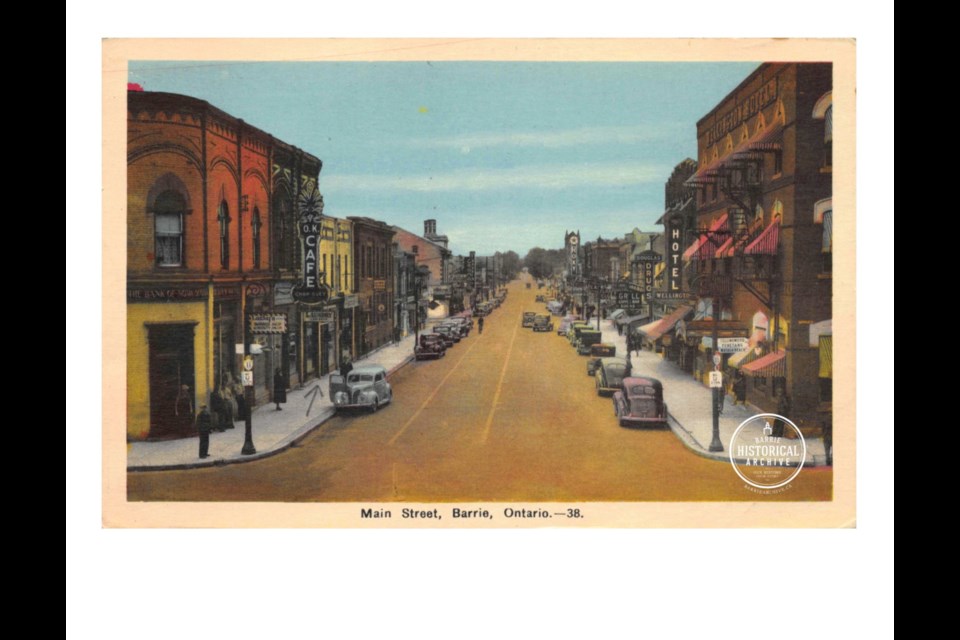To be an immigrant in a new land is never easy.
To step outside of your insulated community and venture into small-town Ontario, where old colonial feelings run deep, is beyond brave, in my opinion.
Yet, many Chinese natives did just that and set up businesses in Barrie and other little communities throughout Canada. They thrived, despite being less than welcome during those early days.
The subtitle shouted 'The Yellow Menace’ in bold black letters.
The reference in the Jan. 19, 1928 edition of the Barrie Examiner was a nod to a decades-old term that had often been used to create fear among people of European descent that people from the Asian race were coming to destroy their way of life, take their jobs and corrupt their women and children.
The term was definitely rather heavy-handed as the article below it was only concerned with the licensing of a simple Chinese café on Dunlop Street.
However, this was the fifth such business to open in town and it appears that some members of council had reached the limit of their anxiety about “being surrounded by the yellow race” as they felt that “white men are being driven out of business.”
Racism, or fear of ‘the other’, is nothing new. It is innumerable, centuries old and carries on today, unfortunately.
In the history of Canada, the Chinese were subjected to a special brand of intolerance that applied to no other race or nationality. It began largely with the building of the Canadian Pacific Railway across Canada.
British Columbia agreed to join Confederation only if they could be linked by rail to the rest of the country.
Prime Minister Sir John A. Macdonald accepted, but declined to adopt a scheme preferred by British Columbia that would have brought in British labourers. Macdonald said that this was unaffordable and that the railway would be built by Chinese men who would work for much lower pay.
Rather than inspire respect for the Chinese workers, who toiled long hours for little money in dangerous situations, their efforts resulted in an intense dislike for them among their non-Chinese co-workers.
This feeling spread and soon the Chinese were painted as dirty people, prone to diseases and promoters of gambling, drugs and prostitution.
In 1885, a head tax of $50 was imposed on anyone immigrating from China, something that no other ethnic group was ever asked to pay.
By 1902, the Wilfrid Laurier government had created a Royal Commission to look into the situation which then reported that the Chinese were “unfit for full citizenship.”
The head tax was raised to $500.
When the flow of Chinese immigrants still did not slow, more rules were created. Language tests emerged. Many jobs required an applicant to be a registered voter which was something denied to Chinese people, as was entry into most professional or community associations.
Health checks and square-footage requirements for dwelling houses were all meant to exclude the Chinese person.
In 1923, only five years before the flap over the new café in Barrie, the most prohibitive anti-Chinese federal law of all was born. It was called the Chinese Immigration Act and it barred almost all immigration from China.
Yet, they ventured forth and left their new land Chinatowns behind.
They bravely opened up restaurants and laundries, nearly the only business opportunities allowed them, in buildings they weren’t permitted to own.
In 1928, when Soo Wah applied to open his Sunrise Café at 36 Dunlop St., already established were City Café, Hong’s Café, O.K. Café and the Barrie Café.
One Barrie alderman and the deputy reeve were both quite concerned about “Canadian citizenship and about the town’s hoteliers that had successfully weathered the prohibition storm.”
Despite the loud objections of the few, the majority of the council reflected the feelings of the Barrie citizens at large and approved the application.
Even the hotel keepers, when asked, were not terribly worried about another Chinese restaurant. Their business hours and menu selections didn’t compete with theirs. They actually welcomed more dining establishments pointing out that “there were times last summer when all the hotels and all the restaurants could not accommodate the crowds” during the tourist season.
The Sunrise Café opened on May 12, 1928. The entire proceeds of grand opening day were donated to the Ladies’ Auxiliary of the Children’s Aid Society. Some $114 (around $1,700 in today’s money) was gratefully accepted to buy clothing for the children.
Each week, the Barrie Historical Archive provides BarrieToday readers with a glimpse of the city’s past. This unique column features photos and stories from years gone by and is sure to appeal to the historian in each of us.



